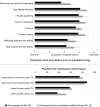Feasibility randomized controlled trial of a self-guided online intervention to promote psychosocial adjustment to unmet parenthood goals
- PMID: 36001052
- PMCID: PMC9527459
- DOI: 10.1093/humrep/deac168
Feasibility randomized controlled trial of a self-guided online intervention to promote psychosocial adjustment to unmet parenthood goals
Abstract
Study question: Is it feasible to implement and evaluate an online self-guided psychosocial intervention for people with an unmet parenthood goal (UPG), aimed to improve well-being, in an online randomized controlled trial (RCT)?
Summary answer: The evaluation of an online bilingual self-guided psychosocial intervention for people with a UPG is feasible, reflected by high demand, good acceptability, good adaptation and promise of efficacy, but minor adjustments to the intervention and study design of the RCT should be made to enhance practicality.
What is known already: Self-identifying as having a UPG, defined as being unable to have children or as many as desired, is associated with impaired well-being and mental health. Practice guidelines and regulatory bodies have highlighted the need to address the lack of evidence-based support for this population. It is unknown if MyJourney (www.myjourney.pt), the first online self-guided intervention for people with UPGs, can be implemented and evaluated in an RCT.
Study design, size, duration: To evaluate the feasibility of MyJourney, we conducted a registered, two-arm, parallel group, non-blinded feasibility RCT, with a 1:1 computer-generated randomized allocation and embedded qualitative process evaluation. Participants were included between November 2020 and March 2021. Assessments were made before randomization (T1), 10 weeks (T2) and 6 months after (T3, intervention group only). Participants allocated to the intervention group received an email to access MyJourney immediately after randomization. Participants in the waitlist control group were given access to MyJourney after completing the 10-week assessment (T2).
Participants/materials, setting, methods: Participants were recruited via social media advertising of MyJourney and its feasibility study. People who self-identified as having a UPG could click on a link to participate, and of these 235 were randomized. Outcome measures related to demand, acceptability, implementation, practicality, adaptation and limited efficacy were assessed via online surveys. The primary outcome in limited efficacy testing was hedonic well-being, measured with the World Health Organisation Wellbeing Index (WHO-5).
Main results and the role of chance: Participation and retention rates were 58.3%, 31.7% (T2) and 45.2% (T3, intervention group only), respectively. Of participants invited to register with MyJourney, 91 (76.5%) set up an account, 51 (47.2%) completed the first Step of MyJourney, 12 (11.1%) completed six Steps (sufficient dose) and 6 (5.6%) completed all Steps within the 10-week recommended period. Acceptability ranged from 2.79 (successful at supporting) to 4.42 (easy to understand) on a 1 (not at all) to 5 (extremely acceptable) scale. Average time to complete sufficient dose was 15.6 h (SD = 18.15) and to complete all Steps was 12.4 h (SD = 18.15), with no differences found for participants using MyJourney in Portuguese and English. Modified intention-to-treat analysis showed a moderate increase in well-being from T1 to T2 in the intervention group (ηp2 = 0.156, mean difference (MD) = 9.300 (2.285, 16.315)) and no changes in the control group (ηp2 = 0.000, MD = 0.047 (-3.265, 3.358)). Participants in the process evaluation reported MyJourney was needed and answered their needs for support (reflecting high demand and acceptability), the recommended period to engage with MyJourney was short, and their engagement was influenced by multiple factors, including personal (e.g. lack of time) and MyJourney related (e.g. reminders).
Limitations, reasons for caution: Participants were mostly white, well-educated, employed, childless women. Non-blinded allocation, use of self-reported questionnaire assessments and high attrition in the intervention group could have triggered bias favourable to positive evaluations of MyJourney and resulted in low power to detect T2 to T3 changes in limited efficacy outcomes.
Wider implications of the findings: MyJourney can proceed to efficacy testing, but future work should eliminate barriers for engagement and explore strategies to maximize adherence. Entities wanting to support people with UPGs now have a freely accessible and promising resource that can be further tested and evaluated in different settings.
Study funding/competing interest(s): MyJourney's development was funded by the charity Portuguese Fertility Association, Cardiff University and University of Coimbra (CINEICC). Dr S.G. reports consultancy fees from Ferring Pharmaceuticals A/S, speaker fees from Access Fertility, SONA-Pharm LLC, Meridiano Congress International and Gedeon Richter and grants from Merck Serono Ltd. Bethan Rowbottom holds a PhD scholarship funded by the School of Psychology, Cardiff University. The other authors have no conflicts of interest.
Trial registration number: Clinical Trials.gov NCT04850482.
Keywords: feasibility; mental health; online psychosocial support; unmet parenthood goals; well-being.
© The Author(s) 2022. Published by Oxford University Press on behalf of European Society of Human Reproduction and Embryology.
Figures



References
-
- Barrera M, Castro FG.. A heuristic framework for the cultural adaptation of interventions. Clin Psychol Sci Pract 2006;13:311–316.
-
- Braun V, Clarke V.. Using thematic analysis in psychology. Qual Res Psychol 2006;3:77–101.
-
- Cann A, Calhoun LG, Tedeschi RG, Taku K, Vishnevsky T, Triplett KN, Danhauer SC.. A short form of the Posttraumatic Growth Inventory. Anxiety Stress Coping 2010;23:127–137. - PubMed
Publication types
MeSH terms
Substances
Associated data
LinkOut - more resources
Full Text Sources
Medical
Research Materials

